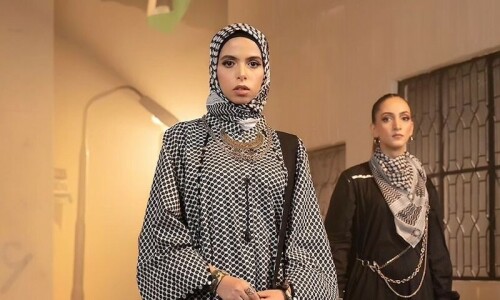For nearly a year, the world has been gripped by the ongoing suffering inflicted upon Palestine by Israel. In response, many have taken action—through protests on social media and in the streets, by boycotting pro-Israel brands, and by expressing their support through art, writing, and fashion.
Fashion statements in solidarity with Palestine have gained particular traction, with celebrities using major events to make their stance on the atrocities clear. Numerous designers worldwide have drawn inspiration from the Palestinian cause, creating special capsule collections dedicated to it.
In Pakistan, designer Nomi Ansari launched such a collection in February, featuring houndstooth prints and keffiyeh-inspired designs. The “Threads of Hope” collection included long shirts, dupattas, crop tops, jackets, waistcoats, scarves, and men’s shirts, all introduced through a striking campaign. While the Instagram posts promoting the line did not explicitly mention Palestine, the keffiyeh—a symbol of Palestinian identity—was highlighted, making it clear that the collection was a tribute to the cause.
Later, in May, actress Hania Aamir wore a suit from the collection to the HUM Style Awards. As she accepted the award for Most Stylish Actress—Television, she used her speech to draw attention to Gaza’s suffering and praised Nomi Ansari for creating a “thought-provoking outfit.”
Recently, designer Maria B. introduced her own capsule line titled “Palestine Collection.” This collection ranges from T-shirts to two-piece and three-piece lawn suits, featuring prints with the black and white keffiyeh, multicolored houndstooth patterns, and the watermelon—a symbol of Palestine’s resistance against Israel. The T-shirts are embroidered with “Falasteen” written in Urdu and the Palestinian map. Additionally, the collection includes accessories such as pendants, rings, earrings, and bracelets, all featuring watermelons, the Palestinian map, and the colors of the Palestinian flag.
These efforts resonate emotionally, but one might wonder what drove these designers to create collections dedicated to Palestine. While they clearly aimed to show their support, were some of the proceeds also intended for the cause?
In an Instagram story following the launch of her collection, Maria B. explained that she couldn’t focus solely on profits. She stated that the entire sales of the collection would be donated to Palestine, emphasizing that even the production costs would be contributed. “For everyone who loves Falasteen, you will love this collection because there are small details in it that will remind you of Palestine,” she shared.
Nomi Ansari, on the other hand, revealed that his primary goal was to raise awareness. “The collection was created in solidarity with Palestine, but I will be honest—the proceeds did not go to Palestine,” Ansari admitted. “It was my way of making a statement through clothes, and I think I succeeded. The designs were worn everywhere—on red carpets and at major ceremonies. Hania Aamir chose to wear a suit from the collection at the HUM Style Awards to show her support for Palestine on a significant platform.”
Could these actions be seen as capitalizing on a cause? Ansari doesn’t think so. “I never considered that,” he said. “I’m fortunate enough to be doing very well with my bridal business. The Threads Of Hope collection was a sincere effort on my part, and I hope to continue making similar contributions to the Palestinian cause in the future.”
In Maria B.’s case, some have questioned how she plans to transfer funds to Palestine, given the well-known challenges and restrictions in making donations to the region. Although she hasn’t specified the details, it’s possible she will partner with organizations that have successfully managed to transfer funds and provide aid in Gaza.
But how does one design a collection inspired by the suffering of a nation in perpetual pain? Are there specific elements that must be considered?
Maria B. shared that several of the models in her shoot were Palestinian, and they deeply influenced her designs. “I studied the embroidery techniques used by their grandmothers and incorporated them into the collection,” she explained. “The keys in the jewelry symbolize the ones their grandmothers kept for years, hoping to return to their homes one day. There is a lot of symbolism in the designs, and creating this collection was an emotional process for my team and me. It was challenging, but anyone who wears these clothes makes a statement in support of Palestine, recognizing their heritage and culture.”
Raising awareness and giving a voice to the people of Palestine is crucial, and every effort counts. Maria B. is a prominent figure in the fashion industry with multiple outlets across the country, and the affordable price points of the Palestine Collection make it accessible to a wide audience, enabling them to make a statement in these difficult times.
Nomi Ansari, known for his meticulous aesthetic and eye for color and pattern, has also made a significant impact. His “Threads of Hope” collection is a high-fashion line that has made statements at star-studded events and awards ceremonies.
From celebrities to the general public, from exclusive award ceremonies to college campuses and cafés, the Palestinian cause must remain at the forefront—from the river to the sea.


